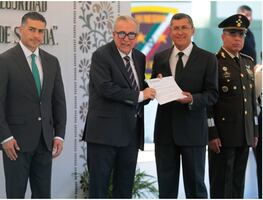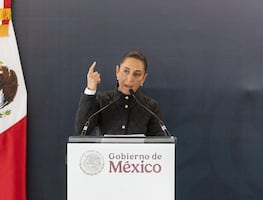Más Información

Derrota de México en disputa por maíz transgénico contra EU; estos son los argumentos de Sheinbaum y AMLO para prohibirlo

Óscar Rentería Schazarino, ha operado contra CJNG, Viagras y Templarios; es el nuevo secretario de Seguridad en Sinaloa

Claudia Sheinbaum pide respeto para Maru Campos; gobernadora anuncia acuerdo para transporte público

Claudia Sheinbaum anuncia los Centros de Cuidado Infantil en Chihuahua; inaugura hospital en Ciudad Juárez
The State and its agencies need goods and services for their everyday operations and turn to the private sector to build the public works required by the country. For that purpose, they request tenders to award contracts. They also organize auctions to allow the exploitation of national resources by private companies, as is the case of the radio spectrum.
In Mexico, the organization that regulates, promotes and supervises the usage and exploitation of the radio spectrum – since almost four years ago – is the Federal Institute of Telecommunications . Thus, a radio and television frequencies were up for tender; however, there have been special situations with those who were awarded the concessions.
A few months ago, the results of the largest tender of radio stations in the country – a total of 257 frequencies were offered – became known. One of the groups who acquired several stations was Tecnoradio , whose partners have connections with the radio group with the greatest penetration in Mexico.
For the Federal Institute of Telecommunications, another objective – their “main” objective, according to their website – is to promote and regulate competition. The lack of severity (or was it naivety and an excess of trust?) of the Institute during the review of all the bidders was this close of going against the encouragement of new players in the radio sector. In the end, the revelations on Tecnoradio ended up preventing its incursion in the sector.
On Monday the result of the television stations bidding – of 29 States – was made public. Two days later, EL UNIVERSAL published that the main business partner of Telsusa , consortium which won channels in 12 cities – is linked to corruption cases in Guatemala and was mentioned in the Panama Papers (which disclosed the names of entrepreneurs and public servants, among others, with millionaire accounts in tax havens). The Institute replied there are no elements to disqualify the winner group.
In television and radio frequency tenders, the economic factor has always predominated, regardless of the profile of the bidders. Currently, it seems that in the awarding of concessions, it matters little if the interested parties have enough experience to handle communication media or if their operations have complied with the law.
The operation of a radio or television station depends on a business model, but there has to be a commitment with the interests of the majority of its citizens and a demand of ethical quality to its owners. This is currently being left in the background.
am






